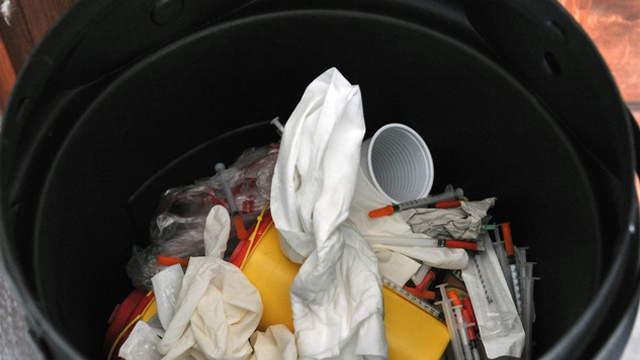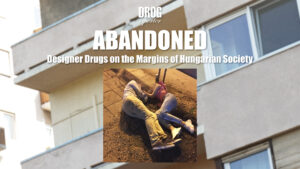Public funding and political support of harm reduction is waning in Hungary.
In September 2013 the Municipial Council of the 8th district of Budapest has decided to terminate the contract with the Blue Point Foundation, an NGO that operates a needle and syringe program (NPS) in downtown Budapest. The aim of the mayor of the district is to close down the service. He claims it attracts drug users to his district from other parts of the city and is responsible for the growing number of abandoned needles and syringes on the streets.
The Ministry of Human Resources (EMMI) has organized meetings behind the scene but has remined silent on this issue in public. According to the government’s position this is a local “legal debate” and the government cannot intervene. The local mayor, Máté Kocsis, even found an unlikely ally in the former secretary of the National AIDS Council, Dr. Eszter Ujhelyi, who gave a controversial interview to a local newspaper (read the English version here!), Józsefváros. In the interview she denies the role of the NPS in preventing infections, saying that “if someone goes into a pharmacy, they can easily buy some (needles)”.
 Professional service providers disagree. One hundred leading drug prevention, treatment and harm reduction experts have sent an open letter to the minister, Mr. Zoltán Balog, urging him to take immediate steps to protect the NSP and speak out against its closure. They point out that the new national anti-drug strategy adopted by the parliament this year has approved needle and syringe programs and mandates the state to scale up these services. There has not been any answer from the ministry to the open letter yet.
Professional service providers disagree. One hundred leading drug prevention, treatment and harm reduction experts have sent an open letter to the minister, Mr. Zoltán Balog, urging him to take immediate steps to protect the NSP and speak out against its closure. They point out that the new national anti-drug strategy adopted by the parliament this year has approved needle and syringe programs and mandates the state to scale up these services. There has not been any answer from the ministry to the open letter yet.
Service providers point out that this is not a local but a national problem: this is the largest NSP in the country that has reached out to approximately 3000 clients since its inception in 2006. These people are mostly marginalised, impoverished Roma injecting drug users who were previously invisible to the treatment system. The NGO decided to move its service to the 8th district because there was an open drug scene at the time, with people injecting in unofficial shooting galleries, playing cat and mouse with the police. Contrary to the accusation that the program attracts drug users from other district, six in ten of the clients of the program live in the same district. This is a slummy part of town which the muncipial council would like to gentrify so drug users, sex workers, homeless people are in the way. Instead of providing marginalised people cheap social housing and access to basic public health and social services, they are pushing them out.
A video we made last year about the needle and syringe program situation in Hungary – for English substitles, click on "Captions"
It is not the NSP that is responsible for abandoned needles on the streets. In 2011 clients of the program returned 70 percent of used needles and syringes to the program but this has dropped to 40 percent this year, because the program had to restrict needle provision due to the lack of financial resources. The NGO reduced its opening hours, dismissed 12 staff members, and restricted the daily number of sterile needles and syringes clients could receive. The NGO has asked the municipality and the national government several times to provide funding and develop a strategic workplan to improve the situation – but with no success. Instead of cooperation, the mayor has chosen to scapegoat the social workers.
The local police also interferes with the work of the NSP by checking and seaxrching young people in the proximity of the service. Clients tend to abandon used needles rather than return them to the program, because of fear of arrest. Even though there is an agreement in place, signed by the Budapest Police and NPSs in 2005, that mandates the police not to interfere, the current administration does not respect this agreement. Most of the clients are Roma, with a higher risk of arrest. Racial profiling by Hungarian police was documented in a recent study conducted by the Hungarian Helsinki Foundation.
The Hungarian Civil Liberties Union (HCLU) submitted a complaint to the civil rights ombudsman, asking him to investigate whether the decision of the municipial authority violates the constitutional right to health of people who use drugs, as well as the right of local citizens to a healthy environment. The HCLU’s complaint highlights robust scientific evidence proving that NSPs are effective in reducing HIV transmissions but have no negative effects on public health or public safety. The paper points out that the arbitrary closure of an operating needle and syringe program in a high-risk environment violates the right to the highest attainable standard health, declared by the International Covenant on Economic, Social and Cultural Rights and ratified by Hungary. It refers to the General Comment no. 14 of ECOSOC, as well as the reports of the Special Rapporteur on the right to health, that mandate the progressive implementation of evidence-based programs necessary to prevent HIV transmission.

Needle and syringe programs in Hungary (source: National Focal Point)
The case of the Blue Point NSP is not an isolated one – there has been a general setback in access to harm reduction programs in Hungary. Another NSP, operated by the Artéra Foundation, had to stop operating for several months because they had no funding. Other programs such as the Drug Prevention Foundation, or the Street Front of the Baptist Charity Service, have also been forced to reduce the services they provide. According to the latest data of the National Drug Focal Point of the EMCDDA, the number of sterile needles and syringes dropped by more than 35 percent between 2011 and 2012, from 648,269 to 420,812. The number of clients has not changed significantly, but client-contacts fell by 14 percent. This means that there is a dramatic reduction in the availability of sterile injecting equipment among injecting drug users. The rate of distribution fell from 114 clean needles per client to 74 clean needles per client – a dangerously low figure. According to the joint recommendations of UNAIDS, WHO and UNODC, the effective prevention of HIV infections among injecting drug users requires a distribution rate in excess of 100 clean needle per client. The sad but inevitable conclusion is that harm reduction programs in Hungary are not effective.

Number of needles distributed by and returned to needle and syringe programs in Hungary (source: National Focal Point)
The drug market has changed a lot as well. A few years ago most people injected heroin but now the majority injects stimulants, mostly new psychoactive substances like Cathinones. Heroin is injected 3-4 times a day, but these stimulants are injected 10-15 times a day. There is a growing demand for clean needles – but supply is down.
The prevalence of HIV among IDUs had remained low for some years. However, this can quickly change. Romania and Greece are the best examples of jurisdictions where HIV prevalence among IDUs was low but has increased rapidly since 2010 due to lack of access to harm reduction services and the growing rate of stimulant injections (watch our video here!). The prevalence of hepatitis C among injecting drug users in the 8th district is already much higher (80 percent) than the national average (25-30 percent). With the rising trend of sharing injecting equipment among drug users it will be a miracle if an HIV epidemic does not break out. If it does though, it is probable that we will not know of it. The program that used to monitor HIV and HCV prevalence among injecting drug users – the national seroprevalence study conducted by the National Center of Epidemiology – has also been terminated.
It is not public health and social service professionals who are to blame for this alarming situation, but the lack of adequate government funding and political support. The dedicated drug-related budget has dropped by 60 percent between 2007 and 2011. Civil society's current target is not the scaling-up of services, but survival! Some NGOs have had to close down or stop effective services, because of the unsustainable funding system. Political support for harm reduction programs is also waning. The government adopted a new national anti-drug strategy that purports to make Hungary a drug-free country by 2020. Harm reduction programs are part of that strategy, but it seems the government does not really care to implement the document. Their new slogan is recovery, abstinence and “clean consciousness”. Most drug users cannot go through recovery, even if they want to do so, because there is low access to services. In July the new Criminal Code came into effect with harsher penalties against drug users, so the most dependent users have more chance of being sent to prison, than of accessing underfunded treatment programs.
The financial crisis cannot be blamed for everything. There is a need for the reallocation of resources from costly law enforcement measures to public health and social services. How can we afford to spend 8-10 billion Forints annually on criminalising young people for drug use, when there is less than 1 billion Forints available for all treatment, prevention and harm reduction programs combined? How can we, Hungarian citizens afford to shut down a program that saves us money by preventing blood born infections?
The concerns of local citizens in relation to the open drug scene are understandable – but the solution is not less, but more, harm reduction. By terminating the program, the mayor will not solve the problem but escalate it. The government must speak out for a solution based on the principles of European drug policies – that is, a balanced, evidence-informed and rights-based approach. Budapest can learn a lot from cities in Western Europe, Australia and North America which have developed effective alternatives to punishmen – such as supervised injection facilities – that can reduce the harms of an open drug scene.
Posted by Peter Sarosi





